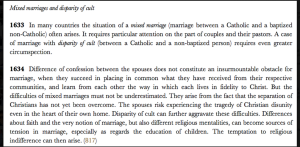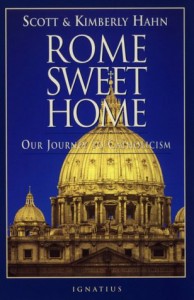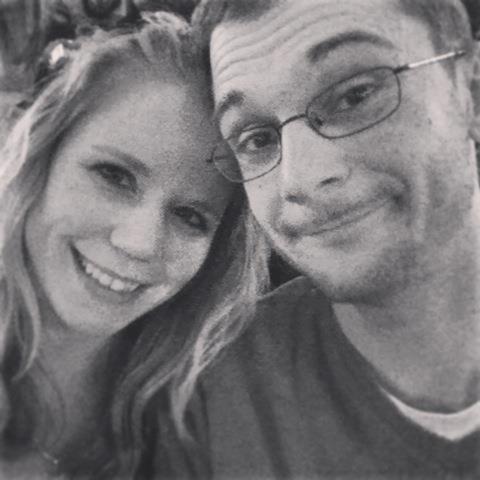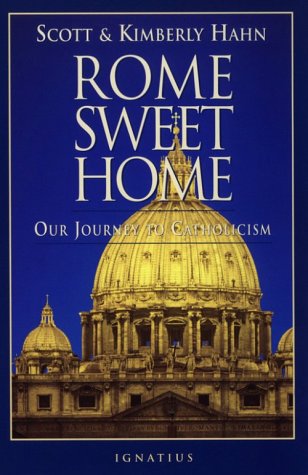I missed the quiet years for a minute today when I stumbled upon an abrasive tweet about the pope, written by an evangelical Christian.
[Guest Post] Should Catholics only date Catholics?
 |
| Guest blogger Anthony Elias and his soon to be wife, Jackie! |
When I was enrolled at my evangelical Protestant seminary, I knew it was important for me to date and eventually marry someone who was of the same evangelical (“non-denominational”) Christian faith. Pastor Mark Driscoll had even persuaded me that I needed to find someone who was of a similar evangelical flavor (“it doesn’t make sense to have your wife praying in tongues at the dinner table while you’re trying to cast out her demon.”)
After emotionally leaving the seminary because I wanted to become Catholic, there was no doubt in my mind that if God did not call me to become a priest, I would marry a Catholic. If Jesus Christ and His Church were the most important things in my life, how could I even think about marrying someone who wouldn’t share that same joy with me? CatholicMatch.com sounded like a fantastic idea, and I was beyond blessed to meet Jackie within days of being on the site (she’s the greatest blessing of my entire life and we’re getting married on June 1).
I’ve been surprised to find a different mentality among many faithful Catholics in the pews. Several young women have asked me if I converted to Catholicism because of Jackie and are disappointed when I say no because, they say, “my boyfriend is non-denominational and we’re trying to figure out what we would do with kids and going to church and stuff.” I like to call this the most predictable problem ever. Many seem to think that if cupid points them to someone with good vibes and they “fall in love,” then that person is the one, no matter if he or she is of the same religion or even has a basic belief in God. Others don’t think very hard about the fact that dating can lead to marriage (“I just want to know them a little better,”) and are eventually confronted with “the most predictable problem ever.”
Instead of being a typical overzealous convert and answering the post’s title, “Yes, of course, and no amount of inspiring stories would convince me otherwise,” let’s see what the Catholic Church says. (A caveat: the following is for Catholics who believe that Jesus Christ founded his Church and gave the apostles and their successors the authority to proclaim doctrine and practice. If these are “man-made rules” to you, I would recommend “What’s Your Authority” and other articles about apostolic succession on Catholic.com)
 |
| from the Catechism of the Catholic Church |
Paragraphs #1633-1637 in the Catholic Catechism address what is called “mixed marriage” and “disparity of cult.” Mixed marriage is a Catholic marrying a non-Catholic Christian, while “disparity of cult” describes a Catholic marrying a non-Christian. As long as the couples are marrying in the Catholic Church and are willing to raise the children in the Church, mixed marriage and disparity of cult are not explicitly forbidden, though disparity of cult is especially discouraged. However, as you can read below, the “difficulties of mixed marriage must not be underestimated,” and the marriage can lead to “religious indifference” (all religions are the same, right? How important is the Eucharist?).
In conclusion, should Catholics only date Catholics? The Catholic Church does not give an unequivocal answer, so I can’t say more than that. However, the Church does say, IT MAY BE A BAD IDEA, THINK HARDER ROMEO, and that’s advice we all could use.
– – – –
About the blogger: Anthony Elias writes at www.evangelicaltocatholic.com . Feel free to contact him on Facebook, Twitter, and Google +.
Faith alone (and why we don’t have to fight about it).
Many Protestant churches teach it’s by faith alone that we’re saved. Many Protestants, in conversations that often turned into arguments, have reminded me that my church – the Catholic Church – doesn’t teach that.
They have said my church is wrong for that.
That I’m wrong for not believing it.
That I should leave my church.
Well I’ve been thinking, and there’s something I need to get off my chest.
The Protestant siblings in Christ who have most often reminded me that my church doesn’t say we are saved by faith alone are the same Protestants who have said they believe my faith in Jesus Christ is legit (i.e., “I know you’re a Christian, despite your church.”).
Well let’s suppose the truth – the whole truth, independent of human interpretation – turns out to be that we are, in fact, saved by faith alone. That my church actually is wrong. What happens when a Catholic has faith – when a Catholic’s faith is legit, despite his or her church?
If it’s by faith alone that we’re saved, and a Catholic really has faith, we can deduce the following:
1. He or she will be saved.
and
2. Neither good works, nor what the Catholic Church teaches about salvation, nor what a Catholic believes about salvation, can negate his or her salvation.
Not only can we deduce points 1 and 2, but if we believe we are saved by faith alone and we believe the Catholic in question has faith, we have to deduce points 1 and 2. Because if we believe we are saved by faith alone and we believe the Catholic in question has faith, we cannot disagree with points 1 and 2. Because if we disagree with points 1 and 2, we might not actually believe we are saved by faith alone.
It’s like this:
If we say we are saved by faith alone but believe a person’s salvation is negated by good works, what we’re really saying is this: Faith literally must stand alone in order to save us, that faith does its job if and only if nobody adds anything to it, including works. Which implies that the Christian life should be one of stagnation until death. We say we’re not only not saved by faith and works, but must avoid works, because they’ll negate our faith-alone salvation (which is contrary to what Christ teaches, and – for the record – is also contrary to what most of my Protestant friends who believe sola fide practice. I know they don’t believe that.).
And if we say we are saved by faith alone, but we believe a person’s salvation is negated if his church doesn’t teach salvation by faith alone, or that a person’s salvation is negated if she doesn’t believe in salvation by faith alone, what we’re really saying is this: We are saved “by faith and by being part of the right church,” or we are saved “by faith and by the belief that we’re saved by faith alone,” or we are saved “by faith and by being right.” We simultaneously say, then, that “it’s faith alone that saves us and it is not faith alone that saves us.” Which means in truth, we don’t believe we are saved by faith alone at all. We believe we’re saved by faith and something else.
I don’t say all this to try to prove you wrong. In fact, if you believe we are saved by faith alone, I’m not even saying you’re wrong.
I’m also not saying you’re right.
And I’m not saying I think right belief is unimportant. (I think it is!)
I’m not saying I don’t think it matters what our churches teach. (I think it does!)
I’m not saying I don’t share the blame for all the conversations that broke down into fights. (We’re all guilty!)
I am saying I think a person can believe it is by faith alone that we’re saved. But I’m also saying that if they believe that and they believe I have faith…
They don’t have to tell me I’m wrong anymore.
They don’t have to tell me my church is wrong anymore.
We don’t have to argue anymore.
There is no reason.
In my head, as I type this, I picture the Protestant v.Catholic fights of yore, in classrooms at the Protestant school where I studied from fifth through twelfth grade. All the times I was told I’m wrong. All the times I was told my church is wrong. All the times we argued. All bricks we added to the wall we’ve built between us. All the bones we broke in the Body. All the ignoring what we have in common. All the division.
I see the lady who told me my church is of the devil. I imagine her reading this post, and shaking her head, and crossing her arms, and saying, “Then maybe your faith isn’t real after all.”
And maybe you’re thinking that now, too.
But if we’re honest with each other, we can conclude that for every person on earth, there are only two people who can know for sure whether his or her faith is real:
The person him or herself, and Jesus Christ.
Some Christians – both the Protestants who believe salvation depends solely on faith and the Catholics who believe there is more to salvation than faith – are in the habit of deciding whether somebody else’s faith is real, anyway.
If we’re honest with ourselves, we know nobody gave me the authority to tell you if you’re saved.
If we’re honest, we know lots of people in both camps have faith and lots of people in both camps do good things and lots of people in both camps have faith and do good things. We can agree with Fr. Benedict Groeschel:
“Many people get involved in that useless old argument over faith and works,” he wrote. “I never met good Protestants who didn’t think they should obey God’s will, and I never met good Catholics who thought they would get to heaven just by doing good works, such as giving away turkeys at Thanksgiving.”
Preach, Fr. B. And I think he’d agree with this (and I hope you do, too):
We do each other a disservice when we act like our mission on earth is to tell other people that they’re wrong.
We do the world a disservice when in lieu of bringing Christ to it as best we can, and in lieu of being His hands and feet in it, we argue.
We do the Kingdom a disservice, when instead of using our time to cultivate our own faith, we use it to make judgments about that of others.
Books in 2012: Rome Sweet Home
 Until I was 10, I thought everybody was either Catholic (like my mom’s side of the family) or Jewish (like my dad’s). My horizons widened when, in fifth grade, my parents pulled me out of public school and put me in the private, non-denominational Protestant school where I studied through my senior year of high school.
Until I was 10, I thought everybody was either Catholic (like my mom’s side of the family) or Jewish (like my dad’s). My horizons widened when, in fifth grade, my parents pulled me out of public school and put me in the private, non-denominational Protestant school where I studied through my senior year of high school.
Every time a teacher discovered my Catholicism, what followed was one of three things: 1.) acceptance of me as a fellow Christian, 2.) fascination with and/or fear of the mystery that is my church or 3.) an unending aggressive attempt to persuade me to become Protestant. And the third response, to the chagrin of the teachers who tried it, ultimately achieved the exact opposite of its intended purpose.
At school, somebody would protest something Catholic and at home, I’d study up. I’d read from the Bible and from books in my mom’s collection. I’d listen to cassette tapes of talks about the Church given by people like a professor named Scott Hahn. And the more I studied and read and listened, the more grateful I was for getting to grow up Catholic. So when recently, I stumbled upon the book Rome Sweet Home: Our Journey to Catholicism by Scott Hahn and his wife Kimberly, I got warm and fuzzy feelings as well as the urge to read it. As of tonight, it is the fourth book I’ve read start to finish in 2012.
I am not as into apologetics now as I was when I was a Catholic in a Protestant school (though I do explain, defend and question when necessary). But the book brought back memories of the years in which I was a little Catholic apologist and brought up points about why the Catholic Church teaches what it does that I hadn’t thought of in years. And their story — how the Hahns met and how they loved and the twists and turns their lives took later — is pretty riveting. For most of his life, Scott was the kind of Protestant who so disliked the Catholic church he’d call it the whore of Babylon. He was a Presbyterian pastor, a Calvinist and on a mission to persuade all the Catholics he met to become Protestant. Kimberly, the daughter of a Presbyterian pastor, wasn’t as anti-Catholic as her husband. But she never would have dated a Catholic, let alone married a Catholic. Which is why she was horrified when her husband became one. And she surprised everyone, when a few years later, she followed suit. Scroll down for some interesting points I dog-eared and/or underlined:
On studying what the Catholic Church teaches about contraception:
“Did our use of birth control reflect how God saw children or how the world saw children? … Perhaps it was more of an American attitude than a godly one to think of our fertility as something for us to control as we deemed best.” -Kimberly, page 36
On sola fide:
“We gradually became convinced that Martin Luther let his theological convictions contradict the very Scripture that he supposedly chose to obey rather than the Catholic Church. He declared that a person is not justified by faith working in love, but rather he is justified by faith alone. He even went so far as to add the word ‘alone’ after the word ‘justified’ in his German translation of Romans 3:28 and called Saint James ‘an epistle of straw’ because James 2:24 specifically states ‘…for we are not justified by faith alone.'” -Kimberly, page 41.
On sola scriptura:
“In my church history class, one of my better students … said, ‘Professor Hahn, you’ve shown us that sola fide isn’t scriptural—how the battle cry of the Reformation is off-base when it comes to interpreting Paul. As you know, the other battle cry of the Reformation was sola scriptura: the Bible alone is our authority, rather than the Pope, Church councils or tradition. Professor, where does the Bible teach that ‘Scripture alone’ is our sole authority?’
I looked at him and broke into a cold sweat.
I had never heard that question before. In seminary, I had a reputation for being a sort of socratic gadfly, always asking the toughest questions, but this one had never occurred to me.
I said what any professor caught unprepared would say, ‘What a dumb question!’ As soon as the words left my mouth, I stopped dead in my tracks, because I’d sworn that, as a teacher, I would never say those words.
But the student was not intimidated—he knew it wasn’t a dumb question. He looked me right in the eyes and said, ‘Just give me a dumb answer.'” Scott, pages 51-52 (Hahn stumped several of his Protestant preacher and professor friends with the same question. None were able to answer it.)
On a day Scott spent with Dr. John Gerstner, a “Harvard-trained, Calvinist theologian with strong anti-Catholic convictions” — a meeting the Hahns hoped would convince Scott to stay Protestant:
“‘Dr. Gerstner, I think the primary issue is what the Scripture teaches about the Word of God, for nowhere does it reduce God’s Word down to Scripture alone. Instead, the Bible tells us in many places that God’s authoritative Word is to be found in the Church, her tradition (2 Th. 2:15, 3:6) as well as her preaching and teaching (1 Pet. 1:25, 2 Pet. 1:20-21, Mt. 18:17). That’s why I think the Bible supports the Catholic principle of sola verbum Dei, the Word of God alone, rather than the Protestant slogan, sola scriptura, Scripture alone.’
Dr. Gerstner responded by asserting—over and over again—that Catholic tradition, the popes and ecumenical councils all taught contrary to scripture.
‘Contrary to whose interpretation of Scripture?’ I asked. ‘Besides, church historians all agree that we got the New Testament from the Council of Hippo in 393 and the Council of Carthage in 397, both of which sent off their judgments to Rome for the Pope’s approval. From 30 to 393 is a long time to be without a New Testament, isn’t it? Besides, there were many other books that people back then thought might be inspired, such as the Epistle of Barnabus, the Shepherd of Hermas and the Acts of Paul. There were also several New Testament books, such Second Peter, Jude and Revelation, that some thought should be excluded. So whose decision was trustworthy and final, if the Church doesn’t teach with infallible authority?’
Dr. Gerstner calmly replied, ‘Popes, bishops and councils can and do make mistakes. Scott, how is it that you can think God renders Peter [the first pope] infallible?’
I paused for a moment. ‘Well, Dr. Gerstner, Protestants and Catholics agree that God most certainly rendered Peter infallible on at least a couple of occasions, when he wrote First and Second Peter, for instance. So if God could render him infallible when teaching authoritatively in print, why couldn’t he prevent him from errors when teaching authoritatively in person? … how can we be sure about the 27 books of the New Testament themselves being the infallible word of God, since fallible Church councils and Popes are the ones who made up the list?’
I will never forget his response.
‘Scott, that simply means that all we can have is a fallible collection of infallible documents.’
I asked, ‘Is that really the best that historic Protestant Christianity can do?’
‘Yes, Scott, all we can do is make probable judgments from historical evidence. We have no infallible authority but Scripture. … Like I said, Scott, all we have is a fallible collection of infallible documents.’
Once again, I felt very unsatisfied with his answers, though I knew he was representing the Protestant position faithfully. I sat there pondering what he had said about this, the ultimate issue of authority, and the logical inconsistency of the Protestant position.
All I said in response was, ‘Then it occurs to me, Dr. Gerstner, that when it comes right down to it, it must be the Bible and the Church—both or neither.'” -pages 74-76
On yielding to God:
“My dad could sense the sadness in my voice.
He asked, ‘Kimberly, do you pray the prayer I pray every day? Do you say, Lord, I’ll go wherever you want me to go, do whatever you want me to do, say whatever you want me to say and give away whatever you want me to give away?’
‘No, dad, I don’t pray that prayer these days.’ He had no idea of the agony I was enduring over Scott’s being Catholic.
He said, genuinely shocked, ‘You don’t?!’
‘Dad, I’m afraid to. I’m afraid if I prayed that prayer, that could mean joining the Roman Catholic Church. And I will never become a Roman Catholic!’
‘Kimberly, I don’t believe it will mean you will become a Roman Catholic. What it means is that Jesus Christ is either Lord of your entire life, or he isn’t Lord at all. You don’t tell God where you will and won’t go. What you tell him is you’re yielded to him.'” -page 115-116.
For more information about the book, click here. For all the posts about books I read in 2012, click here.
How to talk to a Catholic.
“Is that the real man?” -four year old girl, while pointing at the Jesus statue nailed to the giant cross at the front of my church’s sanctuary.
ADORABLE.
“Can priests be black?” -actual grown adult.
ASININE.
Nonetheless, whether legit or ridiculous, I never really have minded the questions much. That is not to say that talking about my church with people who disagree with my church is always easy. And you — Catholic or not — may have experienced that, too. These conversations are not necessarily limited to questions. In my own experience, few inter-ideological discussions had as much to do with a curious sibling in Christ’s questions about my church as with his or her efforts to edify me about “what the Catholic Church teaches” (which is code for “his or her perception of what the Catholic Church teaches.”).
I have a word for conversations like that:
FRUITLESS.
(Unless your goal is high blood pressure. Then, by all means.)
But not all conversations about doctrinal differences have to end with clenched fists, lost sleep and stress-induced acne. There is a set of ground rules, that when agreed upon, can make the experience both educational and enjoyable. I call it “How to talk to a Catholic.” But what it is actually called is the Dialogue Decalogue.
The Dialogue Decalogue is a Ten Commandments-style set of rules to which it is worth it to stick when you’re talking with someone of a different denomination within Christianity, or of a belief system not within Christianity at all.
Below, you’ll find my two personal favorites (a.k.a. the ones my often well-meaning Protestant siblings in Christ usually break when they want to talk Catholicism with me). Below that, you’ll find a link to the whole list.
Ground Rule Four – “One must compare only her/his ideals with their partner’s ideals, and her/his practice with their partner’s practice. Not their ideals with their partner’s practice.” PREACH.
This is like when a Protestant says, “My church teaches X, but you do Y — justify THAT.”
The answer is “I don’t do what your church says to do because I don’t go to your church.” Every time. Fruitless. The alternative? “My church teaches X. What does your church teach about X?” Like a Fig Netwon — fruit-filled.
Ground Rule Five – Each participant needs to describe her/himself. For example, only a Muslim can describe what it really means to be an authentic member of the Muslim community. At the same time, when one’s partner in dialogue attempts to describe back to them what they have understood of their partner’s self-description, then such a description must be recognizable to the described party. YES. Because nothing says “I don’t actually care about you.” quite like “Hi, Catholic. I’m Protestant. Let me tell you what you believe.” (And vice versa, Catholics who like to tell Protestants what they believe!) It is my job to tell you what I believe, and your job to tell me what you believe. Period.
Click here to read the whole Dialogue Decalogue.


